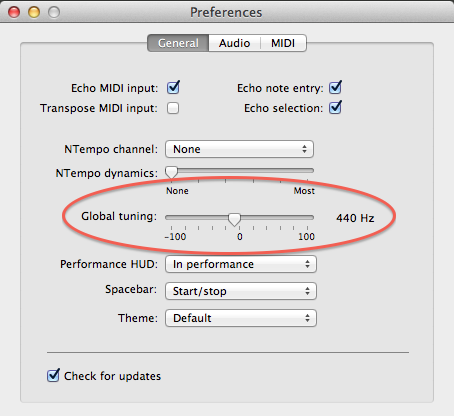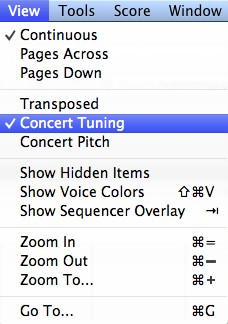Francois2010 wrote:Hi,
My tenors in the sound bank Miroslav give no sound above the note G on the second line of the staff. I'm still looking why.




Thank you!
As you know, I have Miroslav Philharmonik (IK Multimedia), so I did a bit of research, and as best as I can determine IK Multimedia uses an European flavor of scientific pitch notation, which probably is due to their being an Italian company . . .
The general standard for scientific pitch notation is that "Middle C" is C4, but i checked Miroslav Philharmonic with a sine wave generator (SignalSuite), and I think that what they label as "C3" on the mini keyboard for the standalone user interface for Miroslav Philharmonik actually is "Middle C" and what they label as "C4" actually is "High C" . . .
SignalSuite (Faber Acoustical)Scientific Pitch Notation (wikipedia)I checked a few of the Male Choirs presets, and as best as I can determine "C3" in Miroslav Philharmonik is standard "Middle C" (C4) . . .
At present, I am bit into the baritone range, and "Middle C" is a bit high for me to sing, where in standard scientific notation, the upper end of the baritone range is the G4 or G#4, which are the G and G# above "Middle C" . . .
Baritone (wikipedia)Tenor (wikipedia)In contrast, the tenor range is goes to A4, which is the A above "Middle C", but for solo operatic singing apparently goes to "High C" (C5) . . .
However, I did not find anything in Miroslav Philharmonik which specifically included "Tenor" in the name of the preset . . .
The only references are to "Male" rather than specific ranges (Bass, Baritone, Tenor, Countertenor, and whatever) . . .
Similarly, there are no specific references other than "Female" to specific ranges for the ladies . . .
THOUGHTSI sang in a liturgical boys choir for several years, which is the way I learned to read and sight-sing soprano treble clef, and I think that the G above "Middle C" is pretty much at the high-end of the practical range of a typical tenor, because anything higher moves one into the realm of singers like Elvis Presley and Paul McCartney, who actually are very different singers, with Elvis Presley having had an operatic voice and amazing vibrato, while Paul McCartney has no vibrato but an incredible range and amazing sense of vocal harmony (as did John Lennon, although not quite such a high range, since he was a baritone or tenor) . . .
"Unchained Melody" (Elvis Presley) -- 1977 -- YouTube music videoI understand the confusion, and I only realized a few years ago that I am a baritone or tenor, which mostly was due to (a) never giving it much attention in an immediately conscious way and (b) being told when I was in the liturgical boys choir that I was a soprano and nobody telling me anything different since then . . .
More specifically, several years ago I decided to focus on making sense of producing and the various things George Martin did for the Beatles as their choirmaster, producer, and music theory advisor, and one of the things I did when I became what I call "Pretend George Martin" was to listen to myself singing, which was followed very quickly by telling myself several things, among which were (a) I am a baritone or tenor and (b) I need to do a
lot of singing practice before I record myself singing, which I think is excellent advice, noting that it is easy for me to engage in constructive criticism regarding the way I play instruments and so forth, but being my own choirmaster was
not so easy, although I worked through it and now have no problems being my own taskmaster for signing, where the problem was that I imagined my singing was considerably better than it actually was, and having the required epiphany is not such an easy thing to do when you intentionally by design avoid everything that is even remotely likely to lower vocal self-esteem, but the fact of the matter is that switching to being a bit ruthless (which is
not the strategy George Martin used with the Beatles, where he used a very gracious strategy that involved providing them with a set of options and then respected the option they selected), is working nicely, and it makes it easier for me to determine what I do well and where I need to practice . . .
Consider the following song, which I think as a songwriter is good quality for purposes of presenting the song to singers, musical groups, producers, artist and repertoire folks, and so forth . . . "Feel Me" (The Surf Whammys) -- YouTube music videoOn a scale of 0 to 10, I tend to think the singing is 11, but "Pretend George Martin" advises me that it is more in the range of 3 to 5, and this is after doing extensive pitch correction with the Melodyne Editor (Celemony); and the fact of the matter is that Pretend George Martin is right, which is fine with me, since Pretend George Martin also advises me that with plenty of singing practice, there is the distinct possibility of significant improvement, which is part of the work required when one discovers that one is
not a soprano, hence needs to learn how to sing baritone or tenor, both of which are vastly different from singing soprano, primarily because the differences between adjacent notes are considerably smaller, which maps to needing to be precise within a few cycles per second, which makes singing Bass quite difficult, since there is little room for error, where for example the differences in cycles per second from the low pitch "
E" string on an electric bass at standard "Concert A" and the low-pitch "
A" string on an electric bass (or string bass, if you prefer) is approximately 14 cycles per second, and this is for five half-steps, which makes the difference between half-steps approximately 2 cycles per second, where the respective pitches are 41.204-Hz and 55-Hz . . .
Summarizing, I think that the Miroslav Philharmonik Male Choir selections are a combination of bass and baritone rather than tenor, and Miroslav Philharmonik uses an European flavor of scientific pitch notation, while NOTION 3 and NOTION 4 use standard scientific pitch notation; and to be precise, NOTION 4 correctly designates the notes, hence when you set the reference tuning pitch to standard "Concert A" (440-Hz) and specify "Concert Tuning", NOTION 4 correctly uses standard scientific pitch notation . . .
[
NOTE: Standard "Concert A" (440-Hz) is not the NOTION 3 and NOTION 4 default reference tuning pitch, so you need to set it manually via NOTION 3 and NOTION 4 Preferences, as shown in the following screen capture, and this is very important, because most Digital Audio Workstation (DAW) applications use standard "Concert A" (440-Hz) as the reference pitch unless you change it, which you can do with most DAW applications, but then your songs will be out of tune compared to other songs in what one might "popular" genres like Pop, Rock, Rhythm and Blues, Jazz, Country Western, DISCO, Heavy Metal, Easy Listening, Alternative, and so forth . . . ]

 Lots of FUN!
Lots of FUN! 




